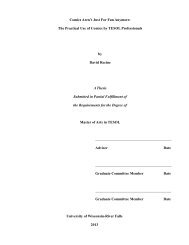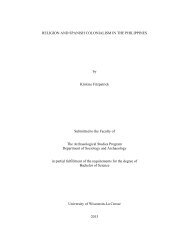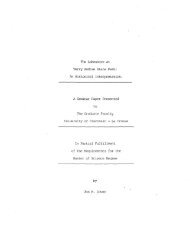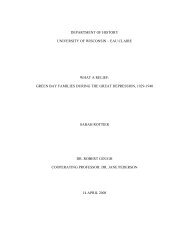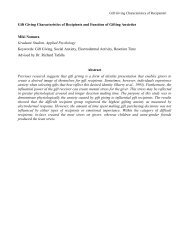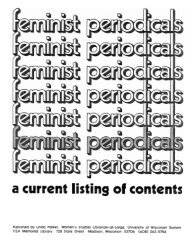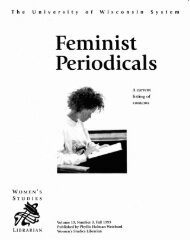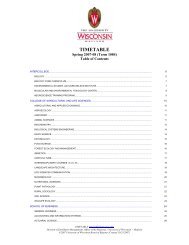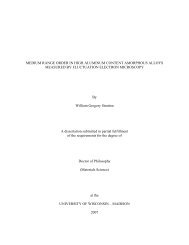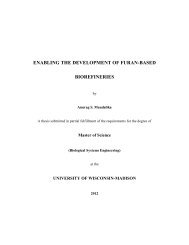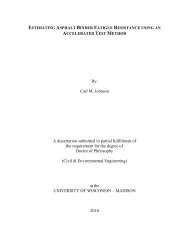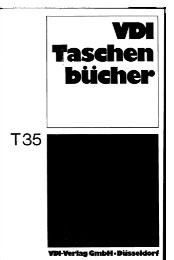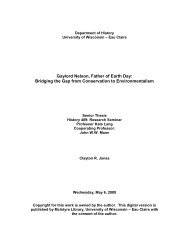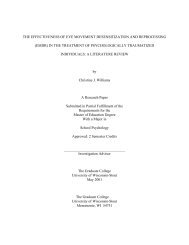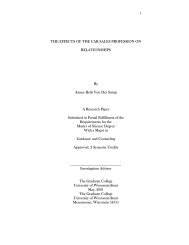1 CONFRONTS THE TEXTBOOK.. - MINDS@UW Home - University ...
1 CONFRONTS THE TEXTBOOK.. - MINDS@UW Home - University ...
1 CONFRONTS THE TEXTBOOK.. - MINDS@UW Home - University ...
Create successful ePaper yourself
Turn your PDF publications into a flip-book with our unique Google optimized e-Paper software.
Pme 8 Feminist Colldons v. 16. no. 1. Fall 1994<br />
WHAT'S SO FUNNY? <strong>THE</strong> EXPLOSION<br />
OF LAUGHTER IN FEMINIST<br />
CRITICISM<br />
by Debra Beilke<br />
Regina Barreca, ed., NEW PERSPECTIYES ON<br />
WOMEN A1M) COMEDY. New York: Gordon and<br />
Breach, 1992. (Studies in gender and culture, v.5) 244p.<br />
ISBN 2-88124-533-1; pap., ISBN 2-88124-534-X.<br />
Regina Barreca, UNTAMED AND UNABASHED: ES-<br />
SAYS ON WOMENAND HUMOR IN BRITISH LIT-<br />
ERATURE. Detroit: Wayne State <strong>University</strong> Press, 1994.<br />
191p. bibl. index. $29.95, ISBN 0-8143-2136-4.<br />
Gail Finney, ed., LOOK WHO'S LAUGHING: GEN-<br />
DER AND COMEDY. Langhorne, PA: Gordon and<br />
Breach, 1994. (Studies in humor and gender, v.1) 363p.<br />
$39.00, ISBN 2-88124-644-3; pap., $20.00, ISBN 2-<br />
88124645-1.<br />
Frances Gray, WOMEN AND LAUGHTER.<br />
Charlottesville, VA: <strong>University</strong> Press of Virginia, 1994.<br />
202p. $35.00, ISBN 0-8139-15124; pap., $12.95, ISBN<br />
0-8139-1513-9.<br />
Linda Moms, ed., AMERICAN WOMEN HUMOR-<br />
ISTS: CRITICAL ESSAYS. New York: Garland, 1994.<br />
(Studies in humor, v.4) 437p. index. $72.00, ISBN 0-<br />
8153-0622-9.<br />
I<br />
Alice Sheppard, MTOONING FOR SUFFRAGE.<br />
Albuquerque: <strong>University</strong> of New Mexico Press, 1994.<br />
276p. ill. bibl. index. $37.50, ISBN 0-8263-1458-9.<br />
"A difference of taste in jokes is a great strain<br />
on the afections." -- George Eliot.<br />
"Laughter, like nuclear energy, has no opinions,<br />
positive or negative, about the status quo. What<br />
it does have, like nuclear energy, is power, to<br />
which we can relate in a number of ways. . . If<br />
feminism is to change all that needs to be<br />
changed, therefore, it is essential forwomen to<br />
clarify their relationship to laughter." --Frances<br />
Gray (p.33).<br />
Frances Gray's comparison of laughter to nuclear<br />
energy is typical of recent feminist inquiry into humor.<br />
Characterizing laughter as an "inflammatory device," a<br />
way to "blow up the law," or to "exploden the foundations<br />
of patriarchy, the writers in these six critical volumes<br />
are the most recent contributors to the eruption of<br />
women's humor scholarship in the past ten years. Despite<br />
subtle variations in their theoretical perspectives,<br />
all of the writers reviewed here agree that female laughter<br />
is a serious thing, that it has been all but ignored by<br />
traditional (mostly male) humor scholars, and that it can<br />
be an unsettling, dis~ptive political force, shaking the<br />
core of male domination.<br />
In addition to disproving the popular misconcep-<br />
tion that women have no sense of humor, feminist critics<br />
have alsobeen interested in discovering what, if any, dif-<br />
ferences there are between male and female senses of<br />
humor. Some of the conclusions have been usefully sum-<br />
marized by Gail Finney in Look Who's Laughing:<br />
They claim, for example, that women tend to<br />
tell comic stories whereas mcn prefer telling<br />
jokes; that the primary aim of women's humor<br />
is communication and the sharing of experience<br />
in contrast to men's use of humor as self-pre-<br />
sentation and the demonstration of cleverness;<br />
that comedy by women is less hostile than that<br />
by men: female comics are more prone to self-<br />
directed putdowns than to putting down oth-<br />
ers, the object of women's humor is the power-<br />
ful rather than the pitiful, and women are less<br />
likely than men to laugh at those hurt or em-<br />
barrassed; that women's stories are often non-<br />
linear; and that in women's comic literature<br />
there is frequently more emphasis on recogni-<br />
tion than resolution and on process than con-<br />
clusion, leading to a lack of happy endings or<br />
closure altogether. (pp.4-5)<br />
Despite this fairly lengthy list of gender differences,<br />
most feminist literary critics of humor have focused on<br />
how women have used humor to underscore the absurdi-<br />
ties of patriarchy in an attempt to subvert the system.<br />
For example, Regina Barreca, one of the pioneers in the<br />
field, has focused mainly on the rebellious, angry nature<br />
of women's humor. She believes that "comedy can ef-<br />
fectively channel anger and rebellion by first making them<br />
appear to be acceptable and temporary phenomena, no<br />
doubt to be purged by laughter; and then by harnessing<br />
the released energies, rather than dispersing them" (New<br />
Perspectives, p.6).



